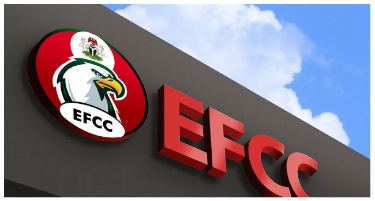The Economic and Financial Crimes Commission (EFCC) has released Phillip Tunji Ojo, a lawyer who had been detained at its facility in Oyo State. Ojo’s release comes just 24 hours after he was arrested in Ibadan, sparking significant outrage among his colleagues and members of the Nigerian Bar Association (NBA), who immediately mobilized to demand his unconditional release.
Ojo’s detention by the EFCC did not go unnoticed, as it triggered a swift and determined response from the Ibadan branch of the NBA. Within hours of his arrest, the NBA members organized a peaceful protest, marching to the Iyaganku zonal office of the EFCC. The protest was a clear demonstration of their frustration and deep dissatisfaction with what they termed the “illegal and unlawful detention” of their colleague, who they argued was simply performing his professional duties when he was taken into custody.
 The chairman of the Ibadan NBA, Ibrahim Lawal, confirmed Ojo’s release in a telephone conversation with news correspondents on Thursday. Lawal explained that the decision to protest was not taken lightly. According to him, the NBA could no longer stand idly by while its members were subjected to what he described as harassment by the EFCC. He emphasized that the protest was necessary to send a strong message to the Commission and the public that the legal community would not tolerate the unwarranted detention of its members.
The chairman of the Ibadan NBA, Ibrahim Lawal, confirmed Ojo’s release in a telephone conversation with news correspondents on Thursday. Lawal explained that the decision to protest was not taken lightly. According to him, the NBA could no longer stand idly by while its members were subjected to what he described as harassment by the EFCC. He emphasized that the protest was necessary to send a strong message to the Commission and the public that the legal community would not tolerate the unwarranted detention of its members.
“Our protest was a reflection of our collective dissatisfaction with the treatment of our colleague,” Lawal said. “It was a peaceful demonstration aimed at drawing attention to the illegal detention of Mr. Ojo and putting an end to the persistent harassment of lawyers by the EFCC. The legal profession must be respected, and the rights of lawyers must be upheld, especially when they are carrying out their lawful duties.”
The protest saw members of the NBA converging on the Iyaganku zonal office in the early hours of Thursday morning. Clad in their professional attire, they carried placards and chanted slogans, calling for justice and demanding the immediate release of Ojo. Despite the peaceful nature of the protest, Lawal recounted that some officers within the EFCC were less than cordial in their interactions with the demonstrators. He described how some of the officers displayed hostility towards the protesting lawyers, a behavior that only heightened the tension at the scene.
However, the situation eventually took a turn for the better when the Zonal Director of the EFCC, Hauwa Garba Ringim, intervened. Recognizing the gravity of the situation and the potential for it to escalate, Ringim engaged with the NBA representatives and assured them that their concerns were being taken seriously. Her intervention was pivotal in securing Ojo’s release, which was met with relief and applause from the gathered lawyers.
In addressing the NBA members after Ojo’s release, Zonal Director Ringim appealed for calm and emphasized the importance of collaboration between the legal community and the EFCC in the ongoing fight against corruption. She acknowledged the concerns raised by the NBA and expressed her commitment to ensuring that such incidents would be handled with greater sensitivity and respect in the future. Ringim’s call for a strengthened partnership between the bar and the Commission was seen as an important step towards fostering a more cooperative relationship between the two entities.
Lawal, while expressing his gratitude for Ojo’s release, noted that the NBA remains vigilant and will continue to advocate for the protection of lawyers’ rights across the country. He reiterated that the association is not opposed to the EFCC’s mandate to fight corruption, but it is equally committed to ensuring that the rule of law is respected and that lawyers are not unfairly targeted in the course of their professional duties.
The release of Phillip Tunji Ojo brings an end to a brief but intense standoff between the NBA and the EFCC




